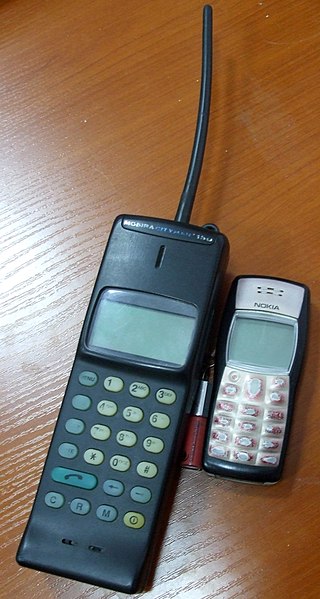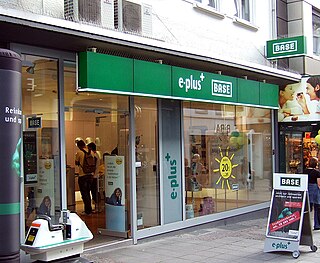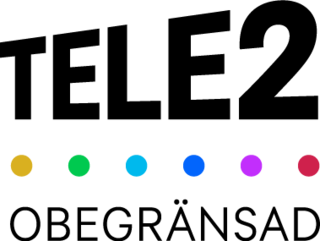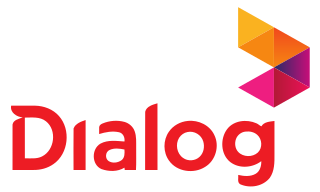
T-Mobile is the brand name used by some of the mobile communications subsidiaries of the German telecommunications company Deutsche Telekom AG in the Czech Republic, Poland and the United States.

Deutsche Telekom AG is a German telecommunications company headquartered in Bonn and is the largest telecommunications provider in Europe by revenue. It was formed in 1995 when Deutsche Bundespost, a state monopoly at the time, was privatized. Since then, Deutsche Telekom has consistently featured among FortuneMagazine's top Global 500 companies by revenue, with its ranking as of 2023 at number 79. In 2023, the company was ranked 41st in the Forbes Global 2000. The company operates several subsidiaries worldwide, including the mobile communications brand T-Mobile. It is the world's fifth-largest telecommunications company by revenue.

NMT is an automatic cellular phone system specified by Nordic telecommunications administrations (PTTs) and opened for service on 1 October 1981. NMT is based on analogue technology and two variants exist: NMT-450 and NMT-900. The numbers indicate the frequency bands used. NMT-900 was introduced in 1986 and carries more channels than the older NMT-450 network.

Hellenic Telecommunications Organisation S.A. is the largest technology company in Greece. It is one of the three largest companies listed in the Athens Stock Exchange, according to market capitalization.

Magyar Telekom Nyrt. is one of the leading Hungarian telecommunications service provider company. It is a subsidiary of Deutsche Telekom.

E-Plus was a mobile telecommunications operator in Germany. With more than 25 million subscribers, E-Plus was the third largest mobile operator in Germany, until the takeover from Telefónica Germany in October, 2014.

Tele2 AB is a provider of mobile and fixed connectivity, telephony, data network services, TV, streaming and global Internet of things services, amongst others, to consumers and enterprises. It is headquartered in Kista Science City, Stockholm, Sweden. It is a major mobile network operator in Sweden, Estonia, Latvia and Lithuania. The company initially founded Tele2 Russia, but later sold all its operations, later rebranding and changing the name to "t2".

Dialog Axiata PLC, is one of Sri Lanka's largest telecommunications service providers, and the country's largest mobile network operator with over 17 million subscribers which amounts to 57% of the Sri Lankan mobile market. Dialog is a subsidiary of Axiata Group Berhad which owns 73.75% controlling stake of the company, while Bharti Airtel owns 10.36%.

A1 Telekom Austria (A1, A eins) is the leading fixed and mobile network operator in Austria, with 5.4 million mobile and 2.3 million fixed-line customers. A1 Telekom Austria traces its origins to Austria's first GSM mobile phone network which began testing in 1992 and commercial operations in 1994, under the name Mobilkom Austria, then part of the Austrian state-owned PTT agency Post- und Telegraphenverwaltung (PTV, ÖPT) until it was split off into its own company in 1996. After Mobilkom's merger with A1 Telekom Austria Group in July 2010 it operates under the new name of A1 Telekom Austria.

The Radio Telephone Network C, was a first generation analog cellular phone system deployed and operated in Germany by DeTeMobil. It utilized the C-450 standard, originally developed by Siemens AG, and was the third and last update of a series of analog mobile phone systems used primarily within Germany, superseding the B-Netz and the A-Netz before it. It has been decommissioned, replaced by both the newer D-Netz and E-Netz systems, both based on GSM standards and operating on 900 MHz and 1800 MHz bands respectively.
The prevalent means of connecting to the Internet in Germany is DSL, introduced by Deutsche Telekom in 1999. Other technologies such as Cable, FTTH and FTTB (fiber), Satellite, UMTS/HSDPA (mobile) and LTE are available as alternatives.

bmobile is a Mobile Phone, Home Security provider, and fixed wireless provider of Trinidad and Tobago, operating as a division of TSTT.

Vodafone GmbH is a telecommunications operator in Germany owned by Vodafone Group Plc and headquartered in Düsseldorf. It provides mobile phone, LTE, 5G, cable internet, landlines, cable TV, and IPTV services. As of the third quarter of 2021, Vodafone GmbH has more than 31 million mobile customers in Germany, making it the third-largest provider of mobile phone services in Germany. The company's headquarters are in the suburb of Heerdt in Düsseldorf, with regional offices throughout Germany. Vodafone Germany's main competitors are 1&1 Mobilfunk, Telekom Deutschland and Telefónica Germany.

Telefónica Germany GmbH & Co. OHG (German pronunciation:[teləˌfɔnɪkaːˈdʒœːɐ̯məniː]; also called Telefónica Deutschland ) is a provider of broadband, landline and mobile telecommunications in Germany. The company trades as O2 (typeset as O2).

1&1 AG is a German telecommunications service and landline and mobile telecommunications provider headquartered in Montabaur, Rhineland-Palatinate and listed on the TecDAX. Since 2017, the majority of the company has belonged to United Internet.
Telecommunications in Germany is highly developed. The German telecommunication market has been fully liberalized since January 1, 1998. Germany is served by an extensive system of automatic telephone exchanges connected by modern networks of fiber-optic cable, coaxial cable, microwave radio relay, and a domestic satellite system; cellular telephone service is widely available, expanding rapidly, and includes roaming service to foreign countries. As a result of intensive capital expenditures since reunification, the formerly antiquated system of the eastern part of the country has been rapidly modernized to the most advanced technology. Deutsche Telekom began rolling out FTTH networks in ten cities in 2011, following the launch of pilot projects in Hennigsdorf, Braunschweig and Dresden in 2010.

T-Mobile Czech Republic, a.s. is a Czech wireless network operator, owned by the German telecommunications provider Deutsche Telekom. T-Mobile is the largest mobile phone network operator in the Czech Republic. As of 31 December 2014, six million customers were using T-Mobile services.

SmarTone Telecommunications Holdings Limited (0315.HK), listed in Hong Kong since 1996 and a subsidiary of Sun Hung Kai Properties Limited, is a leading telecommunications provider with operating subsidiaries in Hong Kong, offering voice, multimedia and mobile broadband services, as well as fixed fibre broadband services for both consumer and corporate markets. SmarTone spearheaded 5G development in Hong Kong since May 2020, with the launch of its territory-wide 5G services. SmarTone is also the first in Hong Kong to launch Home 5G Broadband service.















